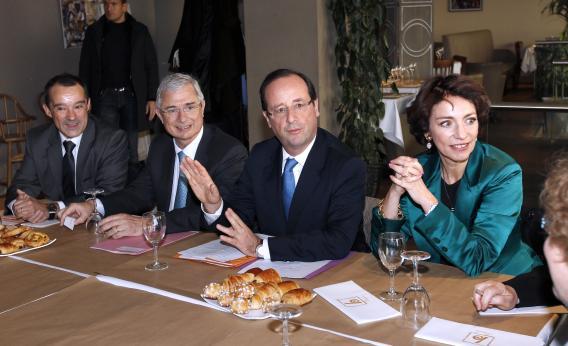This week’s edition of eurozone panic is centered on Spain, and the inevitable conclusion is pretty clear—Prime Minister Rajoy will reaffirm his commitment to austerity and the ECB will sweep in to calm things down. Some more time will be bought, but all the underlying dysfunction will still be in place. The next crisis, however, may center on France and be much worse. In particular, incumbent President Nicholas Sarkozy has been warning French voters that electing his Socialist opponent François Hollande could turn France into the new Greece and has even been hinting that the panic is back precisely because Hollande is leading in the polls. Hollande naturally disputes this (in French) pointing out that we should blame incumbents for the problems under his watch.
But his denials are in a lot of ways unpersuasive in light of his promise to blow up Europe’s existing fiscal compact:
François Hollande a jugé de ce fait d’autant plus urgent de renégocier le traité de discipline budgétaire européen pour lui apporter une dimension de croissance, comme il l’affime depuis plusieurs mois.“Chacun comprend que s’il n’y a que des politiques d’austérité, il n’y aura pas le retour à l’équilibre budgétaire à l’horizon 2017”, a-t-il ajouté.
That says Hollande is doubling-down on a promise to “renegotiate” the eurozone fiscal compact that everyone agreed to last year. And his quote is that everyone understands that if we nothing but austerity policies we’ll never get back to balanced budgets, basically an endorsement of the Summers/DeLong argument about self-defeating austerity. Now this just isn’t going to fly. To say that implementing that agenda would turn France into the new Greece is, if anything, understating the problem. Greece is small and can limp on as a ward of the European Union. If the government of France goes into open conflict with the government of Germany and the European Central Bank over the basic premises of Eurozone economic policy, then you have a profound political crisis at the heart of the project with implications much more profound than anything that could possibly happen in Greece. It’s very possible that Hollande will contemplate the specter of massive capital flight, bank failures, and general chaos and decide to bow to Frankfurt and Berlin the way the (now departed) left-wing governments in Spain and Greece did. But France isn’t Spain—it has nuclear weapons and a seat on the U.N. Security Council. The euro could really break up, or else the powers that be in Germany could be forced to undertake the kind of measures that would be required to make it work.
